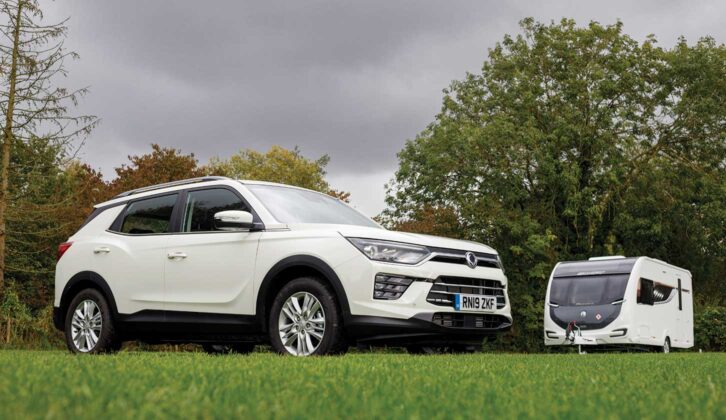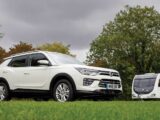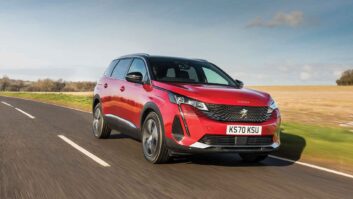Knowing how to choose a used tow car will allow you to enjoy a stress-free start to your caravan tours, giving you stability, practicality and reliability when you’re on the road.
However, failing to pick the best used tow car for your requirements could quickly turn any towing experiences into something you have to bear, rather than enjoy. After all, when you’re towing a caravan, the last thing you’ll want is a car that is sluggish, unreliable or unstable. Therefore, making the right choice is an important factor in enjoyable caravanning when you’re looking for a used option, just as it would be if you were looking for one of the best tow cars on the market.
When you’re choosing the right pre-owned option for you, whether you’re planning on buying the car online or not, there are some extra things to think about and factor in. For instance, it will need to have been looked after by its previous owners, as well as be suitable for towing your tourer.
Don’t forget the warranty factor either. Older cars may not come with one, so you’ll want to ensure you’re picking out a car that will be up to the task.
If you’re wondering how to choose the pre-owned option for you, we’re sharing our top tips to help.
1 Start with the caravan
Whatever the age of car you plan to buy, the first question to ask yourself is: “Will it safely and legally tow my caravan?”
To find the answer, you need to start by knowing your caravan weights. Don’t match by the Mass in Running Order (MiRO), use the Maximum Technically Permissible Laden Mass (MTPLM) instead. This is the heaviest the caravan is allowed to be when fully loaded.
Let’s say your caravan has an MTPLM of 1350kg. To abide by the 85% guideline, which both the big caravanning clubs recommend for safe and stable towing, means choosing a car with a kerbweight of 1588kg (1350 divided by 85, multiplied by 100). So you’ll be looking for a car with a kerbweight of 1588kg or more.
To stay the right side of the law, it will also need to have a legal towing limit of at least 1350kg.
2 FWD, RWD or 4WD?
Most modern cars are front-wheel drive. Some vehicles, usually executive saloons and estates or high-performance cars, are rear-wheel drive. Caravanners looking for the best SUVs for towing caravans will find this type of car will often, but not always, be a 4×4. Some estates and MPVs have 4×4 versions, such as the Audi A6 Avant Quattro.
Setting aside the question of value for a moment, 4WD vehicles generally make the best choice, especially if you plan on regularly towing a caravan in winter or often stay on farm campsites. They also weigh more than 2WD models, which helps with matching ratios.
However, a 4WD model isn’t necessarily going to be the right choice for everyone.
A 2WD version will provide better fuel economy than a 4WD, and will generally cost less on the used market. And if you are considering a 4WD version of an estate or MPV, you might have to search far and wide to track down a good secondhand example, whereas 2WDs will be more plentiful.
If most of your towing takes place in the summer months, and you generally stay on hardstanding pitches, you might not derive enough benefit from 4WD to justify the higher purchase price and running costs.
3. Manual or auto?
When it comes to picking between manual or automatic, there are no firm rules – instead, it’s much more a case of personal preference, a debate that Ian Shaw considers when discussing why he thinks automatics make the ideal towing cars at the moment.
However, make sure you compare the towing limits of both the manual and automatic version of the same model, as they’re not necessarily the same. As an example, the 2011- 2015 Honda Accord 2.2 i-DTEC manual has a legal towing limit of 1500kg – in contrast, the automatic model only has one of 1100kg.
4 The right fuel type
Values of diesel vehicles have certainly weakened over the past few years, but they started out from a position of strength, typically holding on to more of their original price than their petrol counterparts. So now, although that has flipped around and petrol values are usually a few percentage points stronger than diesel values, the price of used diesel cars hasn’t collapsed.
What’s more, this softening of diesel prices can actually play into the canny tow car buyer’s hands. You’ll be paying less than you would have done a few years back for a similar car, and you still get the benefit of better fuel economy. If you happen to recall our petrol versus diesel comparison of two Volkswagen Tiguans in 2018, the diesel returned 30.3mpg and the petrol 20.8mpg, towing the same tourer on the same route.
It’s now quite common for electric cars, hybrids and plug-in hybrids to be approved for towing. Full hybrids and plug-ins have improved a great deal as tow cars in the past few years, and now rival the best diesel tow cars. Pure electric cars can perform strongly in acceleration and stability, but their range and the difficulties of recharging while towing count against them.
You can tow with a handful of pure electric cars, and some self-charging and plug-in hybrids. Of these, the Mitsubishi Outlander PHEV is most likely to be on your shopping list. It’s no better than middling as a tow car, but it could make sense for an owner who mostly completes short journeys and can regularly rely on electric power alone.
5 Read reviews and reliability surveys
We regularly put two tow cars to the test in each issue of Practical Caravan. What’s more, each issue also includes a used car buyer’s guide. So put that pile of back issues to good use when coming up with your shortlist of used tow cars. There’s also a library of 122 tow car video reviews on our YouTube channel.
Clearly, new car buyers don’t want their vehicle to break down. But reliability has to be an even bigger factor when choosing a used car, especially one that will be facing the extra wear and strain of towing.
Take a good look at reliability and owner satisfaction surveys to refine your shortlist of possible models. It will pay to check reliability surveys, such as What Car?’s annual study. Even if the model you are thinking of buying isn’t listed, results for the manufacturer will be informative. Owner satisfaction studies are also very useful.
6 Towball, or not?
One of the oldest clichés in used car buying guides is to walk away if the car has a towball. While this is clearly nonsense, it really does pay to check what a used car has been towing.
If you are buying from a private seller, ask what they tow and make sure it’s not more than the car could reasonably handle.
If the car already has a towball fitted, be very sure that it has been maintained properly, especially in terms of the clutch and the gearbox.
If the car doesn’t have towing gear, look into the cost of having this fitted before you buy. Check with the manufacturer if cars with factory-fit towing gear have additional cooling fitted, because this can be extremely expensive to retrofit.
Conclusion
If you’re wondering how to choose the right pre-owned towing car, it’s a case of doing your research first.
Once you know the weight of your tourer and have thought about the type of towing you will be doing, you’ll have narrowed the shortlist down. Use our tow car reviews to further whittle it down and take a look at reliability surveys to see which models prove durable on the road. Then find a good example of the right car for you, and you’ll be well on your way to a happy towing experience.
- This guide talks you through the process of reversing a caravan
If you’ve enjoyed reading this article, why not get the latest news, reviews and features delivered direct to your door or inbox every month. Take advantage of our brilliant Practical Caravan magazine SUBSCRIBERS’ OFFER and SIGN UP TO OUR NEWSLETTER for regular weekly updates on all things caravan related.









